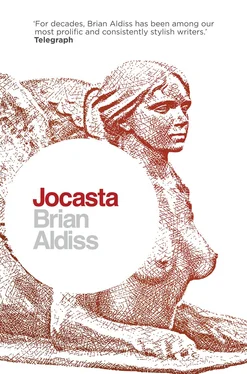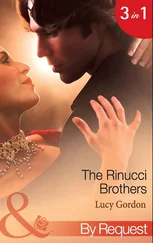The mare replied, as she struck the ground with a hoof, ‘Though you command horses, yet are you harnessed to your fate.’
Oedipus looked anxiously about him. It appeared that no one had noticed the horse speaking her prophecy. Rather than hear another word, he whacked Vocifer’s flank and moved away from her. The evil look she had given him, more than her words, disturbed him. The mare snorted in contempt. She never spoke another word.
He took up a position beneath the four-pillared portico, to remain with arms akimbo. There he stood impassively waiting, giving no sign of his inward apprehensions, as first Antigone and Ismene came out, settling themselves rather sulkily in one of the carriages. Jocasta emerged next from the palace, smiling, dressed in a blood-red robe, her hair tied with a red ribbon. Her personal servant, Hezikiee, followed, garbed in her usual dusty black. Behind them, goaded on by a slave driver, came a small company of slaves – including Sersex on whom, Semele asserted, Antigone had cast an eye.
A rug draped about her shoulders, ancient Semele, bent but stormy, came out to witness their departure.
‘You will find no salvation by the dragon-haunted sea,’ she said. ‘What you will find is the beginnings of destruction. Be warned. Stay home, Oedipus, stay home!’
He set his gaze forward, away from the old woman.
‘Go back to your den, harridan,’ was all he said.
‘I am keeping Polynices and Eteocles with me, in my care.’
‘Send my sons out to me at once, harridan.’
Pouting, she brushed bedraggled strands of hair from her eyes. ‘They stay with me!’
Without raising his voice, he said, ‘Send out my sons at once, or I will come and whip them out, and whip you into the bargain.’
‘You are nothing but a brute, Oedipus!’ With that, she slowly turned her old bent figure, withered as a prune, to make her way back into the inner courts.
A few minutes later, the two sons of Oedipus and Jocasta emerged, eyes downcast, and made to climb into the carriage with their sisters and mother.
‘You are not women,’ said Oedipus to his sons, in a quietly threatening voice. ‘You will walk beside me along the way to the seashore.’
‘But, Father—’ began Eteocles.
His father silenced him with a terrible voice. ‘You will walk beside me to the seashore. I will teach you lads philosophy yet.’
The boys went dumbly to him where he stood, beside the carriage loaded with their provisions. He patted their shoulders.
‘Courage, boys. We require the help of Apollo. To be obedient pleases the gods. Compliance delights Apollo.’
In this manner, the Oedipus family prepared to go to the coast.
The procession wound its way through the streets of Thebes, bone dry and dusty under the thrall of a new day. Many citizens came out of their homes to watch from their poor doorsteps as the procession passed. Few cheered. Few jeered. Who would venture to express disgust of their king, when his intercessions at the temple of Apollo, at Paralia Avidos, might deliver them from the present miseries which afflicted their city? And moreover, to entertain another line of argument supporting the wisdom of silence, to venture criticism now was to risk losing that small but eloquent instrument of criticism, the tongue – if not the entire head housing it …
Only dogs dared to run snarling at the heels of the soldiery and the wheels of the carriages as they rumbled through the uneven streets. These hounds were grey. The streets they prowled were grey. Even the garb of the citizens, protracted through poverty beyond their best years, was grey. The houses, too, were of a slatey tone under the leaden sky. It was as if Apollo had withdrawn the benison of colour from the once-thriving city of Thebes.
Once through the gates and out in open country – heedless of the failing crops – the Oedipus family found its spirits reviving. The daughters, now reconciled, their squabbles forgotten, began to sing in sweet voices. They sang, ‘Mother, You Are Ever-Loving’, and then, in descending sentiment, ‘Where Did I Leave That Undergarment?’
They had some twenty miles to travel to the temple of Apollo at Paralia Avidos, on the shore of the warm sea, where they hoped a better future awaited them.
The ruined village of Eleo stood on their route, inhabited now by nothing living but goats and a few scrawny hens. The hens had long since relearnt the art of flight. They rose clucking out of the path of the procession. Beyond the ruins, the entourage entered on a more dreary landscape. Here began bleak heathland, denuded of trees, where three ancient roads met: the roads from Delphi, Ambrossos and Thebes. The procession took the right-hand fork, which led to the coast. A white commemorative stone stood by the track. This was the region called Phocis.
Jocasta gave a small shriek, belatedly attempting to smother it in the hem of her red robe. Her daughters asked her why she shrieked.
‘I thought I saw a wolf lurking by the bush,’ she said.
‘Where? Where?’
‘Over there!’ She stretched out one of her shapely arms, to point vaguely into the distance.
‘You saw nothing but what was in your mind, Mother,’ said Antigone, patting Jocasta’s arm.
While her sons argued the possibilities, and the lack of desirability, of being attacked by wolves, a different dialogue was playing in Jocasta’s mind.
She was of a noble family, its history darkened by feuds and vendettas. Fathers had strangled their sons, mothers had slept with their daughters, brothers had raped their infant sisters. The juices of their line had become mixed. Yet they had been learned; they understood astronomy and kept doves and enjoyed music, sport and drama. Jocasta herself had been an independent-minded child. She was the jewel of her mother Hakuba’s eye. Her grandmother Semele then lived away in the forest.
Semele had come to look after her grandchild only when Hakuba had died unexpectedly. Those were the years of Jocasta’s greatest grief.
In her adolescence, she had become a keen runner. Only the generous size of her breasts had robbed her of a championship in the Theban games.
She had thought nothing of marrying Prince Laius. She considered it her birthright to wed into the royal line. She knew – her father had told her as much – that Laius had at an earlier age cohabited with two wild youths whom, in a drunken quarrel, he had stabbed to death. What were these sins but the follies of youth, the jeux d’esprit of a bold disposition? Besides, now that he was King of Thebes, Laius was as beyond reproach as he was above the law.
So Jocasta wed Laius. Laius wed Jocasta.
Oaths were sworn. Flowers were thrown.
The throats of many nanny goats were cut.
Offerings were made, dances danced, wine consumed.
Jocasta’s tastes were lascivious. This pleased Laius.
The marriage went well enough. At least she lived in a palace.
There was that trouble with Athens.
Laius became more brutal. He lost interest in Jocasta sexually. He preferred beating her to making love to her. All these recollections flowed through her mind like blood from an altar.
There came the night, filled with the greyness of a watching moon, when she dined with her brother Creon, spilling out her troubles in confidence to him, exhibiting her bruises. Creon was good to her. Creon and she had enjoyed carefree sexual relations when children.
They had spurned conventional entrances. It was long ago.
Creon grew up to be a stubborn law-abiding man, wedded to the fair Eurydice. He had never forgotten his early affection for his sister. Nor had Jocasta ceased to love her elder brother. She knew his weaknesses. She knew, too, that he coveted the throne on which her husband Laius reigned.
Читать дальше












